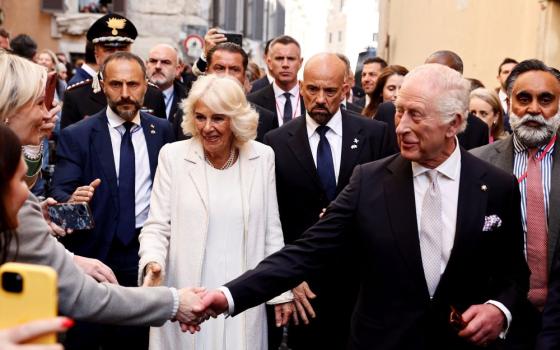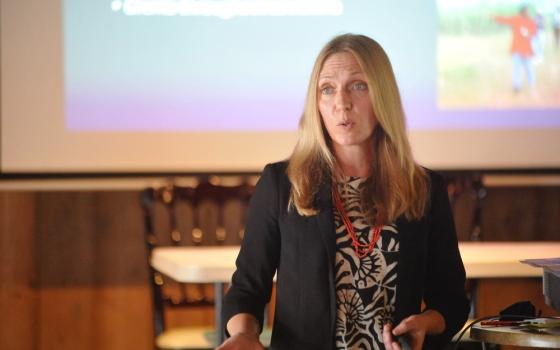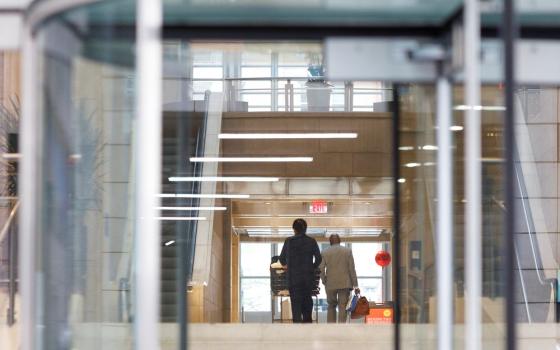
Jesuit Father Dean Brackley, who volunteered in 1989 to help replace faculty members slain at the Jesuit University in El Salvador during its bloody civil war, died Sunday in San Salvador. He was 65.
Brackley, a member of the New York Province of Jesuits when he relocated to San Salvador, served at Central American University from 1990 until his death. He was diagnosed with pancreatic cancer four months ago.
Brackley will be remembered for his tireless efforts to build awareness and solidarity between churches and universities in the United States and the poor in Central America. He wrote and lectured extensively on the need for higher education to connect scholarship to service and resources to the social reality of the poor.
His personal witness, meticulous scholarship and passion for the poor made him a voice of conscience within the global network of Jesuit schools in their response to the violence in El Salvador. His role in welcoming and orienting thousands of church delegations from the United States and Europe to the realities of Latin America helped shape the "accompaniment" of sister parishes and other advocacy groups, which in turn influenced a change in U.S. policy in the region at the end of the 12-year civil war and with the peace accords in 1992.
But when Brackley arrived at the airport in El Salvador in January 1990, he entered a war zone. His room at the Jesuit residence would be yards from the small garden where the bullet-riddled bodies of the Jesuits were found, their blood and brains spattered on the nearby walls. It was just down the hall from a parlor where the housekeeper and her daughter were killed at the same time, their decision to remain on campus overnight based on the assumption that they would be safer there because the army had sealed off the area during an offensive by the rebels.
The nighttime massacre of the six faculty members and the two women sent shock waves around the world in November 1989, shining a spotlight on U.S. support for the Salvadoran military in a civil war defined by the anticommunist rhetoric of the time.
When it was revealed that Salvadoran army commandos who had just returned from training in the United States had carried out the murders, outrage was organized into the ongoing annual protest at the School of the Americas in Columbus, Ga., where Latin American militaries have been receiving training for decades. For a time, Jesuit colleges, universities and high schools formed the backbone of the protest against the school. The protest's broad geopolitical implications permeated the curricula and public stances of some of the United States' most prestigious schools, whose graduates have held high-level positions at the State Department and Pentagon.
Brackley took up duties on staff at Central American University and for the next two decades administered the School for Religious Education and assisted in schools for pastoral formation. He brought to El Salvador his 10 years of teaching theology and ethics at Fordham University in New York and his experience in social ministry in Manhattan's Lower East Side and in the South Bronx, where he encountered the kind of structural poverty and social breakdown he would witness in El Salvador in the aftermath of the war.
Born in upstate New York in 1946, Brackley entered the Jesuits in 1964. He was ordained a priest in 1976 and received a doctorate in religious social ethics from the University of Chicago's Divinity School in 1980.
In coming to Central American University, Brackley was stepping into the powerful currents of thought exemplified by Jesuit Father Ignacio Ellacuría, who, some say, was the main target of the government's wrath in the campus assassinations.
Ellacuría, a Spanish Jesuit who had come to El Salvador in 1947, helped to define the role of the university not as a source of private education for the privileged but as a source of empowerment that was to be projected into the social reality around it. The focus of education was not just to provide successful careers but genuine social analysis so graduates could address structural injustice and enter the process of change. Brackley would often say it was for this audacious understanding of higher education that Ellacuría and the others were killed.
Brackley worked closely with Father Jon Sobrino, another Jesuit at the university who escaped assassination by being out of the country the night of the raid. Sobrino's writings on liberation theology reflect Ellacuría's view that Archbishop Oscar Romero lived out the vision of the "church of the poor" proclaimed at the 1968 meeting of Latin American bishops with Pope Paul VI in Medellín, Colombia. Romero's death in 1980 had revealed the full cost of accompanying the poor when wealth and power are entrenched against change.
But the paschal mystery was also visible in such self-sacrifice as the source of hope and resurrection. Brackley's deepening analysis of the plight of the poor would connect the dots between Medellín and the complex inequities built into trade agreements, global capitalism, immigration policy and the war on terror. But his analysis was always within the theological vision that God is with the poor, making them ambassadors to the rest of us, evangelists who invite us to save ourselves by responding to their plight.
In numerous talks and in time spent teaching at universities in the United States, Brackley laid out the radical challenge that education and privilege place upon the shoulders of those with resources, often describing what contact with the poor does to us: "First, it breaks your heart, then you fall in love, then you're ruined for life."
In a July 1 email to friends, Brackley told of the cancer diagnosis, his hopes for more time to continue his work, but also of his surrender to God's will:
"The faith factor is decisive, as you know. When I ask you and Monseñor Romero to pray, I mean: Let us pool our faith. Mine is weak enough, but with all of us, that is another matter. God wants to give life more than we want life. St. Ignatius wrote to Francisco Borja: I consider myself wholly an obstacle to God's work in me. In other words, the exercise of faith, our fundamental human challenge, gets us out of the way of God's work. So, let us pray.
"I cherish your friendship now more than ever. Un fuerte abrazo. Dean"
On Aug. 29, when treatment options in California proved ineffective, Brackley returned to El Salvador. He died shortly after 11 a.m. Oct. 16, surrounded by his Jesuit brothers and close friends.



